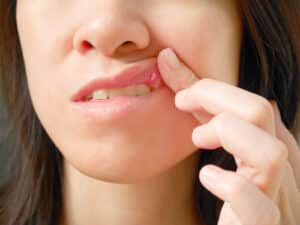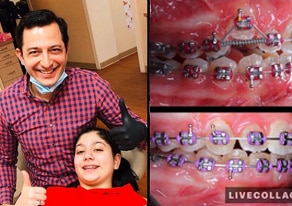Living with braces can feel uncomfortable at times, and one of the most common problems is a mouth ulcer from braces. These small sores can make eating and speaking painful, and they often appear when the wires or brackets rub against the inside of your mouth. While they are frustrating, they are also manageable.
In this article, we’ll explain why mouth ulcers happen with braces, how to relieve the pain, and what you can do to heal faster. You’ll also learn simple ways to prevent them from coming back.
Common Causes of Mouth Ulcer from Braces

A mouth ulcer from braces usually develops from friction. The brackets and wires create constant contact against the soft tissues inside the cheeks, lips, and tongue. When that pressure continues, small sores appear and can quickly become painful.
Another common cause is a poor adjustment period. After new braces are placed or tightened, your mouth needs time to adapt. During this stage, irritation is normal, and ulcers may form as your tissues adjust to the changes.
Sometimes the shape or position of the braces can add to the problem. Sharp wire ends or loose brackets create more irritation than usual. These issues should be checked and corrected by a trusted orthodontist to prevent ongoing discomfort.
Symptoms You Shouldn’t Ignore with Braces Ulcers
A mouth ulcer from braces often starts as a small sore, but the discomfort can build quickly. The first sign is usually a tender spot inside your mouth that becomes more noticeable when you eat or talk.
As the sore develops, you might see redness around the area or a white or yellow coating on the surface. Pain may increase when chewing, brushing, or even when your lips and cheeks move against the braces. These are common braces mouth ulcer symptoms that signal irritation.
Pay attention if the sore lingers or worsens. If swelling spreads, pain becomes severe, or you notice signs of infection, it’s important to contact your orthodontist. Ignoring these warning signs can delay healing.
- Visible sores inside the cheeks, lips, or tongue
- Red or white patches that feel sore to the touch
- Discomfort when chewing, brushing, or speaking
A mouth ulcer from braces may seem like a minor issue, but it can affect your daily comfort in a big way. By knowing the signs and taking action early, you can keep the irritation from getting worse and make sure your treatment stays on track. If symptoms continue or interfere with eating and speaking, getting professional advice is the safest step.
Fast Relief and Home Remedies for Braces Ulcers
When a mouth ulcer from braces starts to cause pain, simple steps at home can make a difference. Rinsing with warm salt water is one of the most effective options. It helps reduce bacteria, eases irritation, and supports healing. Doing this a few times a day can calm the sore and keep it from worsening.
Another helpful option is orthodontic wax. Applying a small piece over the bracket or wire that causes irritation creates a smooth barrier. This reduces friction and allows the sore to heal without constant rubbing. Over-the-counter numbing gels can also provide quick comfort, especially before meals.
Cold therapy is another way to relieve pain. Holding a piece of ice or sipping cold water can temporarily numb the area. Soft foods, like yogurt or oatmeal, also lessen pressure on the sore. These simple home remedies for braces ulcers can speed up recovery and make daily life more comfortable.
How to Prevent Mouth Ulcers While Wearing Braces
Preventing a mouth ulcer from braces often comes down to consistency with small habits. Using orthodontic wax regularly is one of the easiest ways to stop irritation before it starts. It creates a cushion between your braces and the inside of your mouth, giving sensitive areas time to stay clear of sores.
Good oral hygiene also plays an important role. Brushing with a soft-bristle toothbrush keeps your mouth clean and reduces the chance of infection if a sore develops. Flossing daily with threaders or orthodontic floss helps keep bacteria under control, which can speed up healing and prevent new ulcers.

Regular orthodontic checkups are another way to stay ahead of problems. Your orthodontist can trim or adjust wires that cause irritation and check that your braces fit correctly. Following their advice helps reduce ongoing friction and discomfort.
- Apply orthodontic wax to irritating brackets or wires.
- Brush gently with a soft-bristle toothbrush.
- Avoid hard, crunchy, or acidic foods.
- Rinse with salt water to soothe irritation.
- Schedule regular checkups to catch issues early.
Staying consistent with these habits not only helps prevent a mouth ulcer from braces but also makes treatment more comfortable overall. Small adjustments to your routine can go a long way in protecting your mouth and keeping your orthodontic journey on track. If you notice recurring ulcers despite these efforts, it’s best to consult your orthodontist for guidance.
FAQs About Mouth Ulcer from Braces
How long does it take a braces ulcer to heal?
Most mouth ulcers from braces heal within 7 to 10 days. Healing time can vary depending on how often the area is irritated and how well you manage it at home.
Can diet affect mouth ulcers from braces?
Yes. Acidic, spicy, or very salty foods can make ulcers more painful and slow down healing. Choosing soft, bland foods can reduce irritation while your mouth recovers.
Are mouth ulcers from braces contagious?
No. Ulcers caused by braces are not contagious. They are the result of friction or irritation, not an infection that spreads.
Do brace ulcers leave scars?
In most cases, mouth ulcers from braces heal without leaving scars. If the sore is severe or repeatedly irritated, it may take longer to heal, but scarring is rare.
Should I stop orthodontic treatment if ulcers keep coming back?
No. Ulcers are a common part of wearing braces and usually improve with time and care. If they are frequent or very painful, your orthodontist can make adjustments to reduce irritation.
Discover Personalized Care at Halabi Orthodontics in Brooklyn
At Halabi Orthodontics, creating confident smiles is personal. Dr. Eli Halabi and his team combine advanced technology with genuine care to make treatment comfortable and effective. Conveniently located on Kings Highway in Brooklyn, the practice proudly serves patients from surrounding neighborhoods.
As a top-rated orthodontist in Brooklyn, Halabi Orthodontics offers a full range of options, including braces and Invisalign. Their goal is to make every step of the process as smooth as possible while helping patients achieve a healthy, lasting smile.
Schedule your appointment with Halabi Orthodontics today and take the next step toward a smile you’ll love.

 CURRENT PATIENT NUMBER
CURRENT PATIENT NUMBER

 What patients are saying
What patients are saying Your smile our passion
Your smile our passion News and Events
News and Events